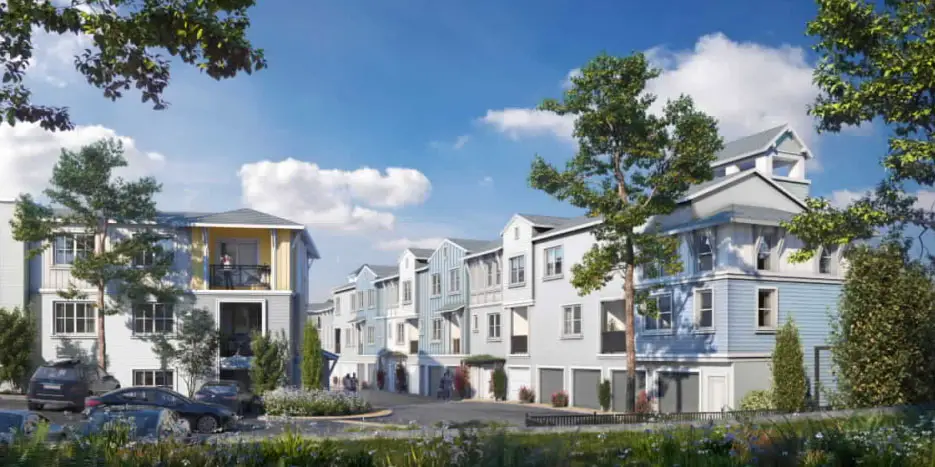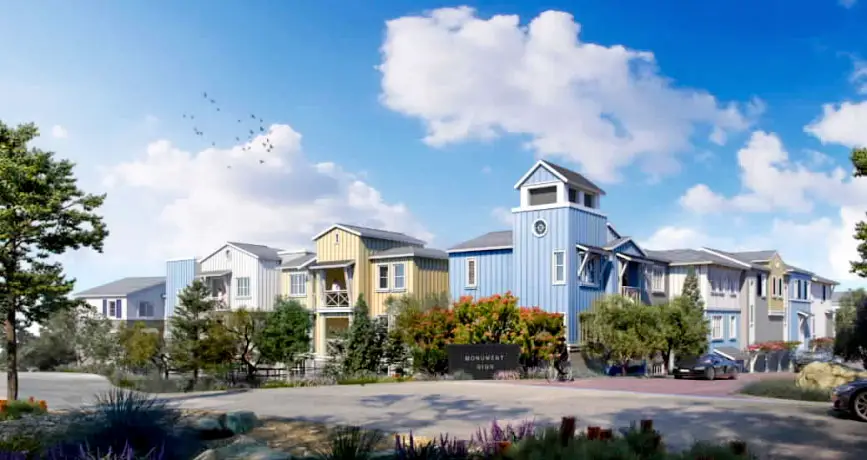ENCINITAS — The Encinitas Planning Commission recently denied permits for a proposed 199-unit apartment complex on Clark Avenue in Leucadia due to the project’s anticipated negative traffic impacts on neighborhood roads.
The Planning Commission voted 4-0 — with Commissioner Robert Prendergast absent — to deny the permitting and boundary adjustment of the Clark Avenue Apartments project during its Aug. 4 meeting.
Chairman Kevin Doyle said despite the decision, housing units are slated for that particular site on the city’s Housing Element and encouraged further street improvement talks between the developer and city staff.
“Council decided that there will be houses here, and there will be at least 195 units,” Doyle said. “We want this project to be done properly, and to be done properly, it’s going to have to have the proper mitigation measures in place.”
The applicant, Western National Properties, did not respond for comment, but is expected to appeal the decision before the Encinitas City Council.
Subdivision or not?
Western National Properties sought the construction of 199 rental units in the place of two single-family homes and nursery sites in the 600 block of Clark Avenue and 500 block of Union Street. The project includes 15 buildings with 20% dedicated to low-income housing — or 40 units — on six lots over 6.22 acres.
The applicant requested a boundary adjustment of four lots, which would create three total legal lots on the property, with ingress/egress proposed for both Union and Clark.

The site is “by right,” as it was approved for at least 195 units in an area designated for high density per the city’s housing plan.
The by-right designation means the Planning Commission must support projects unless there are direct contractions to existing city standards. Under this classification, the developer is also exempt from submitting an environmental impact report, or EIR, and permitted certain exceptions as a density project.
However, Doyle, who motioned to deny the permits, remained unconvinced the property was not a subdivision and therefore was required to conduct an EIR.
“I see this as an attempt to avoid a subdivision,” Doyle said, “[That] was improper. I see this as a subdivision.”
Anna Colamussi, the city’s planning manager, said the state requires a subdivision map when six or more lots are consolidated — anything under five is not considered a subdivision and is exempt from an EIR.
“So for this case, the consolidation is for only four lots… two of the lots remain exactly as they are today, untouched,” Colamussi said. “Therefore, the request is only for the four lots.”
Colamussi added this is a consistent practice, noting the Goodson project.
Entry points
The single entry point for each of the lots is on Union Street — a factor not one of the project’s supporters was apt to change.
“Our legal, safe access is going to be Union,” said Brian Ardolino, a project manager at Pasco Laret Suiter & Associates working on the Clark apartments.
Residents from the working-class Leucadia neighborhood filled the Encinitas City Council chambers speaking in opposition to the project due to its impact on Union Street, which many residents — and Ardolino — have described as a “rural street.”
“That’s part of the character of it,” Ardolino said, adding that Western National Properties wants to be a good neighbor.
The developers submitted hundreds of pages of analysis related to the project’s impact on air quality, landscape, and traffic safety.

The applicants further maintained they did their due diligence and that no environmental impact report is required nor will be conducted.
“We did every study the city asked us to do,” Ardolino said. “Every single study that was requested of us from traffic to greenhouse gas. We did every study that would have been done under an EIR, but for the EIR in the public process.”
Kenneth O’Neill, senior director at Western National Properties, addressed comments labeling the traffic study “inadequate,” arguing the study used numbers from 2021 and included adjustments to pre-COVID levels.
“There are no holes in the traffic study, it’s a clear objective standard, and that’s what this commission is required to apply,” O’Neill told commissioners, adding the application includes road improvements required by city agencies.
However, commissioners argued that the proposed red curbs and interest in future projects are insufficient.
“Union is not a suitable road for what’s about to happen to it, and I feel that had an EIR been done on this, [it] would have zeroed in on this more than anything else,” Doyle said. “This is the big flaw of this project. The way in and out just sucks.”
Lack of outreach?
Another critical point in his motion was the “inadequate” outreach to the Spanish-speaking residents, who comprise a notable portion of the population in the neighborhood.
Sylvia Pezzoli, a lifelong area resident, said she received no information regarding the project in Spanish. So she went around asking her neighbors.
“All (my neighbors) confirm that they did not receive opportunities to view the presentation or have input in this project in Spanish,” Pezzoli said.
Pezzoli said the lack of communication silenced a large portion of the neighborhood.
“There was no Spanish outreach on this project at all,” Doyle said. “I imagine if there were better outreach in Spanish, we would have more Spanish speakers here.”

Commissioner Steve Dalton — who made an earlier motion to approve the project contingent upon the applicant putting up its “fair share” toward roadway enhancements — reminded Doyle that the applicant followed all the required measures.
While a lack of outreach to Spanish-speaking residents wasn’t the point driving the commission’s motion to deny, Doyle said it was a key factor.
Infrastructure concerns
More than two dozen residents spoke out against the infrastructure’s inability to safely withstand additional traffic, a charge led by mayoral candidate Cindy Cremona.
Cremona and her neighbors claimed they felt bullied and alleged the project is falsely being used to help the city meet its Regional Housing Needs Allocation, or RHNA, goals.
“As a mature, working-class neighborhood, we were an easy target for a project that is long on concessions for the developer and short of diligence and safety considerations for existing residents,” Cremona said.
Residents told The Coast News they had little or no prior communication regarding the Clark Avenue site’s consideration for the Housing Element, nor the opportunity to address thoughtful concerns.
The current Housing Element for 2021-2029 states that at least 195 units may go into the proposed Clark Apartments to meet the city’s very low and low-income housing obligations under RHNA.
The Clark Avenue Apartments site, or Site AD31/Meyer Property, was preliminarily submitted (under SB 330) in January 2021. Historically, two-family homes and agriculture nurseries have been on the site. Some allege the change of hands in this deal was done unfairly and misrepresented the community.
In 2018, the Encinitas City Council voted to remove a property known as “L-7” from the Housing Element. Like many density projects in the city, it was highly contested with legal threats from the public.
In its place, the City Council designated the six-lot site of the proposed Clark Avenue Apartments.



